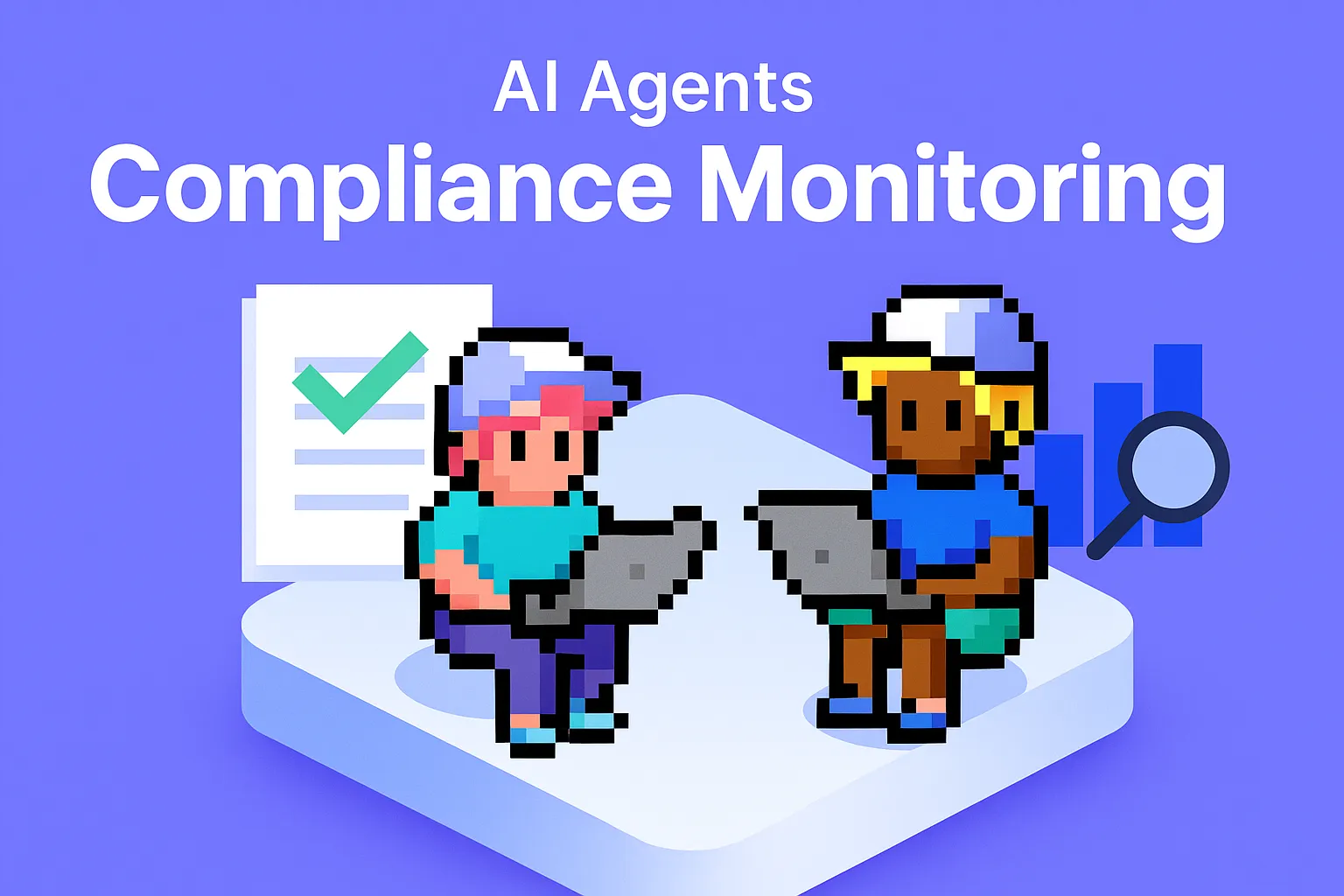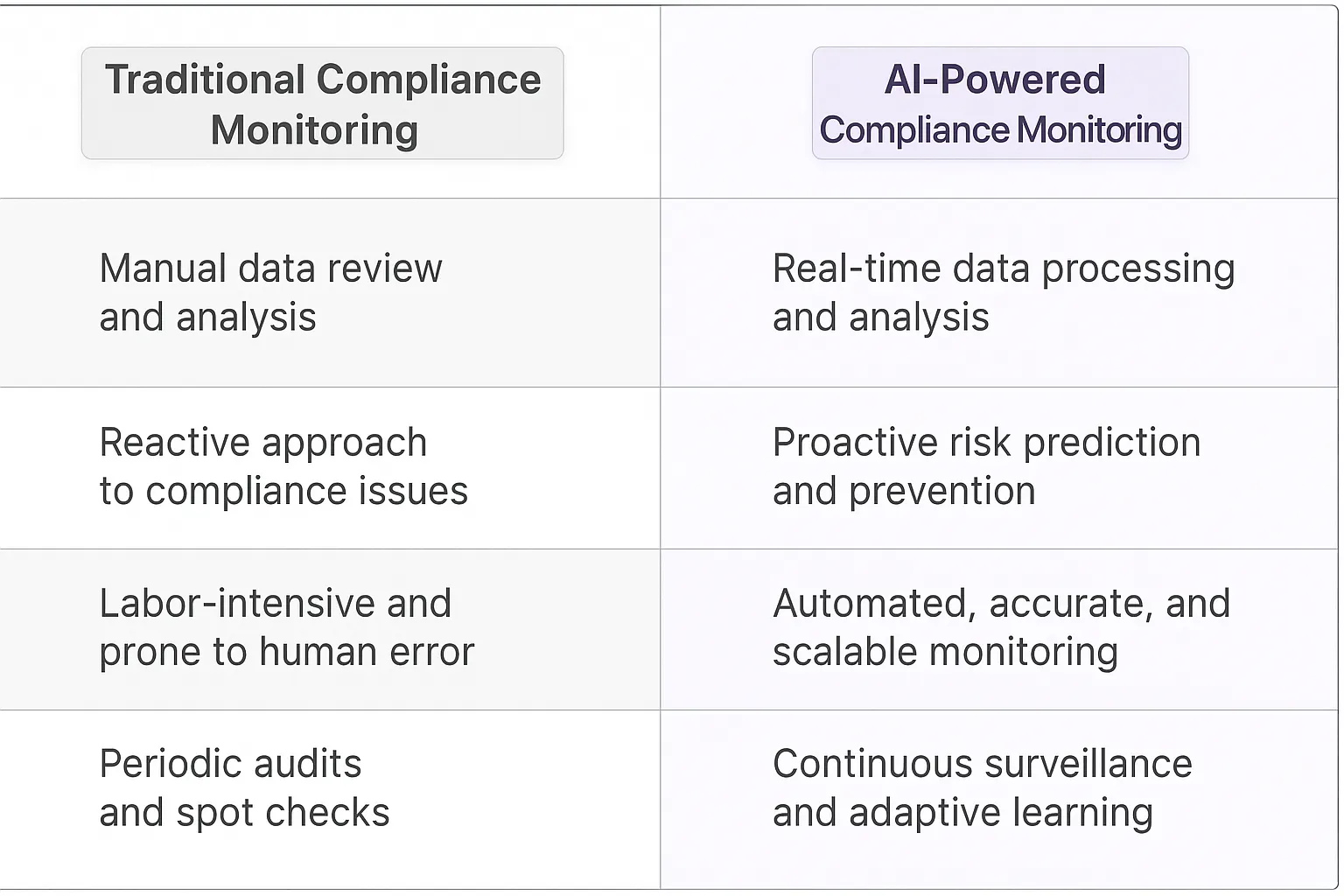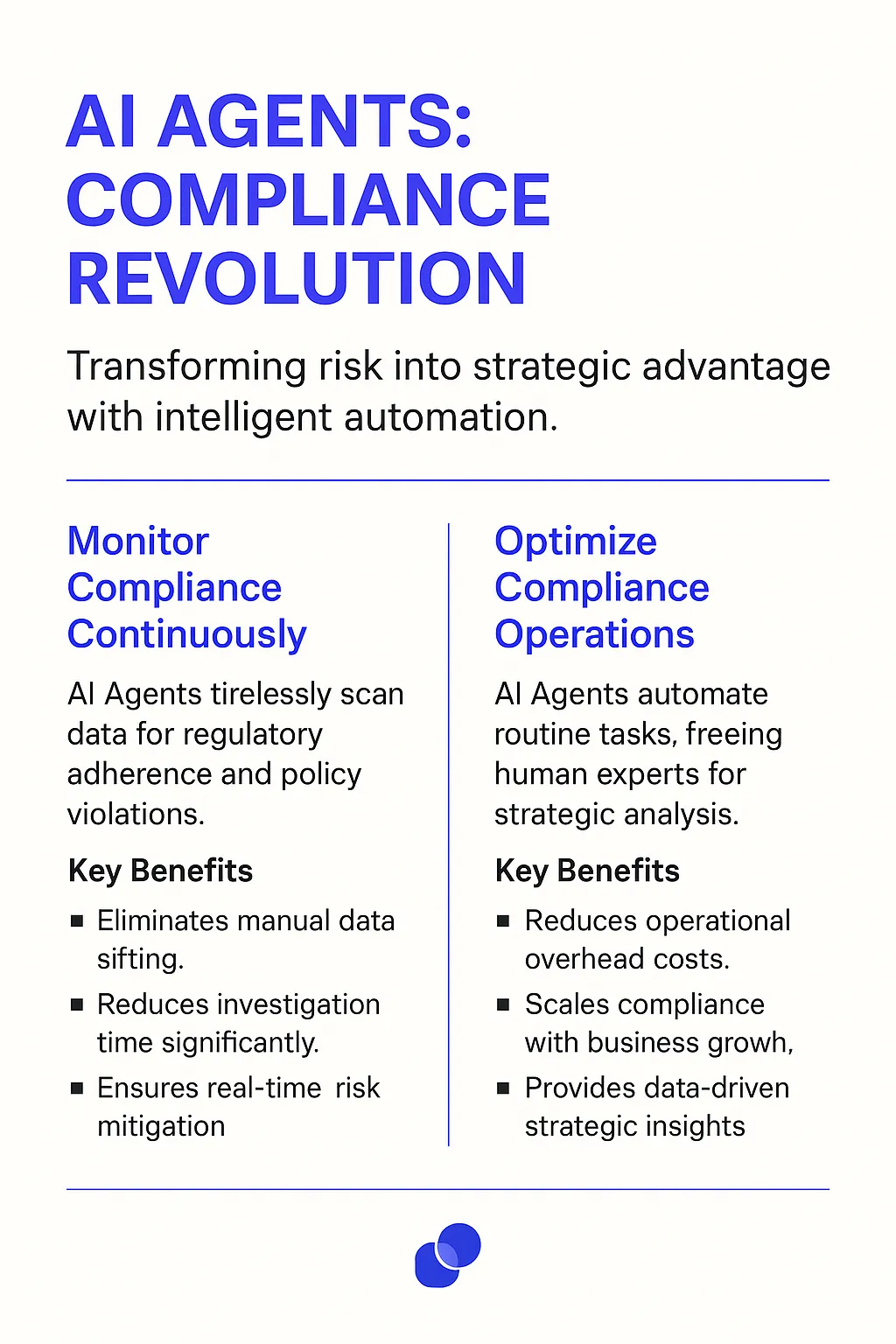Compliance Monitoring AI Agents
The Evolution of Compliance Monitoring with AI Agents
What is Compliance Monitoring?
Compliance monitoring is the ongoing process of reviewing an organization's activities to ensure they adhere to relevant laws, regulations, and internal policies. It's a critical function that helps businesses avoid legal issues, maintain ethical standards, and protect their reputation. In the past, this was a labor-intensive process prone to human error. Now, AI agents are changing the game.
Key Features of Compliance Monitoring
AI-powered compliance monitoring brings several game-changing features to the table. These include real-time data processing, adaptive learning capabilities, and customization for specific regulatory environments. AI agents can scale effortlessly as businesses grow, handling increased complexity without breaking a sweat. They also provide detailed audit trails, offering a comprehensive history of compliance efforts that's invaluable during regulatory inspections.

Benefits of AI Agents for Compliance Monitoring
What would have been used before AI Agents?
Before AI agents entered the scene, compliance monitoring was a tedious, manual process. Teams of analysts would sift through mountains of data, trying to spot irregularities or potential violations. It was like searching for a needle in a haystack, but the haystack was made of bureaucratic paperwork and the needle was a subtle regulatory infraction.
Companies relied on a combination of human expertise, basic rule-based software, and periodic audits. This approach was not only time-consuming but also prone to human error. It's hard to maintain vigilance when you're drowning in spreadsheets and policy documents.
What are the benefits of AI Agents?
Enter AI agents for compliance monitoring, and suddenly we're playing a whole new ballgame. These digital teammates are like having a team of tireless, hyper-focused compliance experts working 24/7. They don't get bored, they don't miss details, and they certainly don't need coffee breaks.
First off, AI agents can process vast amounts of data in real-time. They're constantly scanning transactions, communications, and activities across the organization. This means they can flag potential issues as they happen, not weeks or months later when it's too late.
But it's not just about speed. These AI agents are learning machines. They get smarter over time, adapting to new patterns and evolving regulatory landscapes. They can spot subtle correlations and anomalies that human analysts might miss. It's like having a compliance expert with perfect memory and the ability to see connections across years of data.
Another killer feature? Customization. Every industry, every company has its unique compliance needs. AI agents can be tailored to your specific regulatory environment. They're not just following a generic rulebook; they're enforcing your particular policies and procedures.
Let's talk about scalability. As your business grows, your compliance needs become more complex. AI agents can scale effortlessly. Whether you're monitoring a hundred transactions or a million, the AI can handle it without breaking a sweat.
Finally, there's the audit trail. AI agents provide detailed, timestamped records of their monitoring activities. When the regulators come knocking, you've got a comprehensive, easily accessible history of your compliance efforts. It's like having a perfect memory of every compliance check you've ever done.
In essence, AI agents for compliance monitoring are transforming a necessary evil into a strategic advantage. They're not just helping companies stay out of trouble; they're providing insights that can drive better decision-making and risk management across the board. It's compliance monitoring on a whole new level, and it's changing the game for businesses across industries. The sophisticated data processing capabilities of these AI agents enable them to handle complex regulatory requirements with unprecedented accuracy and efficiency.

Potential Use Cases of AI Agents for Compliance Monitoring
Processes
Compliance monitoring is a critical yet often tedious aspect of business operations. AI agents are poised to transform this landscape, offering a level of efficiency and accuracy that human teams struggle to match. These digital teammates can continuously scan vast amounts of data, identifying potential compliance issues in real-time.
One key process where AI shines is in regulatory change management. As regulations evolve, AI agents can automatically update compliance frameworks, ensuring companies stay ahead of the curve. They can also automate the creation and maintenance of audit trails, providing a comprehensive record of all compliance-related activities.
Another crucial process is risk assessment. AI agents can analyze historical data and current trends to predict potential compliance risks before they materialize. This proactive approach allows companies to allocate resources more effectively and mitigate risks before they become costly problems.
Tasks
On a more granular level, AI agents excel at numerous compliance-related tasks. They can monitor employee communications across various platforms, flagging potential insider trading or other unethical behaviors. These digital teammates can also review financial transactions in real-time, identifying suspicious patterns that might indicate money laundering or fraud.
In the realm of data privacy, AI agents can continuously scan systems for personal data, ensuring it's properly classified and protected in accordance with regulations like GDPR or CCPA. They can also automate the process of generating compliance reports, saving countless hours of manual work.
For industries with specific regulatory requirements, such as healthcare or finance, AI agents can be trained to understand and apply complex rules. They can review patient records for HIPAA compliance or scrutinize financial products for adherence to SEC regulations.
The beauty of these AI-driven tasks is their scalability. As your business grows, these digital teammates can handle increasing workloads without the need for proportional increases in human resources.
The Andrew Chen Take on Compliance Monitoring AI Agents
Let's talk about the compliance monitoring space. It's a massive market, ripe for disruption, and AI agents are the perfect tool to shake things up. We're not just talking about incremental improvements here - we're looking at a fundamental shift in how businesses approach compliance.
Think about the current state of compliance monitoring. It's labor-intensive, prone to human error, and often reactive rather than proactive. Now, imagine injecting AI into this mix. Suddenly, you've got a system that's always on, always learning, and always adapting to new regulations and potential risks.
The network effects here are fascinating. As more companies adopt these AI agents, the collective intelligence of these systems grows exponentially. Each interaction, each compliance check, each risk assessment feeds into a growing pool of knowledge that benefits all users.
But here's where it gets really interesting: the potential for AI agents to move beyond mere monitoring and into the realm of predictive compliance. By analyzing patterns and trends across vast datasets, these digital teammates could anticipate regulatory changes before they happen, giving businesses a crucial edge in an increasingly complex regulatory landscape.
We're looking at a future where compliance isn't just a box to check, but a strategic advantage. Companies that leverage AI for compliance monitoring will be able to move faster, take calculated risks, and ultimately outperform their more cautious competitors.
The winners in this space will be the companies that can build AI agents that are not just smart, but also trustworthy and explainable. Compliance is all about trust, after all. The AI agents that can clearly articulate their decision-making process will be the ones that gain widespread adoption.
In the end, compliance monitoring AI agents aren't just about reducing costs or improving efficiency. They're about fundamentally changing the relationship between businesses and regulators, creating a more dynamic, responsive, and ultimately more effective regulatory environment. That's the kind of transformative potential that gets me excited as an investor and as a technologist.

Industry Use Cases
The versatility of AI agents in Compliance Monitoring makes them valuable across various industries. Let's dive into some meaty, industry-specific use cases that showcase how AI can transform workflows and processes. These aren't your run-of-the-mill examples – we're talking about AI that's so integrated, it feels like it's been part of the team since day one.
From financial services to healthcare, manufacturing to tech, AI is reshaping how we approach compliance. It's not just about ticking boxes anymore; it's about creating a compliance ecosystem that's proactive, adaptive, and dare I say, almost intuitive. We're seeing AI agents that don't just flag issues but predict them, learn from patterns, and even suggest optimizations.
In the following examples, you'll see how AI is becoming the unsung hero of compliance teams across different sectors. It's not replacing human expertise – it's amplifying it, allowing professionals to focus on high-level strategy while AI handles the heavy lifting of data analysis and routine monitoring. The integration of advanced quality control mechanisms ensures that compliance standards are maintained at the highest level across all operations. Let's explore how these digital teammates are changing the game in compliance monitoring.
Financial Services: Compliance Monitoring AI Agents Redefine Risk Management
The financial services industry is a prime candidate for compliance monitoring AI agents. These digital teammates are transforming how banks, investment firms, and insurance companies navigate the complex web of regulations and internal policies.
Take the case of a global investment bank. They're dealing with a tsunami of transactions daily, each potentially carrying regulatory risks. Traditional methods of compliance monitoring involve armies of analysts poring over spreadsheets, often missing critical red flags due to human error or sheer volume.
Enter compliance monitoring AI agents. These digital teammates can process millions of transactions in real-time, applying complex rule sets and machine learning algorithms to identify potential compliance breaches. They're not just looking for obvious violations; they're spotting subtle patterns that might indicate money laundering, insider trading, or fraud.
But here's where it gets interesting: these AI agents aren't just passive observers. They're active participants in the compliance process. When they detect a potential issue, they can automatically escalate it to the right team, compile relevant data, and even suggest remediation steps based on historical cases and best practices.
The impact? A dramatic reduction in compliance risks, faster response times to potential issues, and a significant decrease in false positives that waste valuable human resources. It's not just about cost savings (though those are substantial); it's about creating a more robust, responsive compliance framework that can keep pace with the ever-evolving regulatory landscape.
This shift is creating a new paradigm in financial compliance. Compliance officers are evolving from data analysts to strategic risk managers, leveraging AI insights to proactively shape company policies and practices. The sophisticated financial analysis capabilities of these AI systems enable them to identify complex patterns and correlations that would be impossible for human analysts to detect manually. It's a transformation that's not just changing how financial institutions operate – it's redefining the very nature of risk management in the industry.
Manufacturing: AI Agents Reshape Compliance in the Factory of the Future
The manufacturing sector is undergoing a seismic shift, and compliance monitoring AI agents are at the forefront of this transformation. These digital teammates are not just tools; they're becoming integral parts of the manufacturing process, ensuring compliance at every step of the production line.
Let's zoom in on a cutting-edge automotive plant. This isn't your grandfather's assembly line - it's a complex ecosystem of robots, IoT sensors, and human workers, all generating massive amounts of data. Traditional compliance monitoring here is like trying to drink from a fire hose. It's overwhelming, inefficient, and prone to costly oversights.
Compliance monitoring AI agents change the game entirely. They're not just passive observers; they're active participants in the manufacturing process. These digital teammates are constantly analyzing data from every corner of the plant - from the temperature of welding robots to the torque applied to each bolt, and even the air quality in the paint shop.
What's truly fascinating is how these AI agents are evolving. They're not just checking boxes on a compliance checklist. They're learning, adapting, and predicting potential issues before they occur. For instance, an AI agent might notice a slight deviation in the performance of a robotic arm. It's not a compliance violation yet, but based on historical data and predictive modeling, the AI knows it could lead to one. It proactively alerts maintenance, potentially preventing a major quality control issue down the line.
The implications are profound. We're seeing a shift from reactive to proactive compliance. These AI agents are enabling manufacturers to stay ahead of regulatory changes, adapt to new sustainability requirements, and maintain the highest quality standards - all in real-time.
But here's where it gets really interesting: these AI agents are becoming key players in continuous improvement. They're not just enforcing rules; they're identifying patterns and insights that lead to process optimizations. A compliance check might reveal an opportunity to reduce energy consumption or minimize waste, directly impacting the bottom line.
This is creating a new breed of manufacturing professionals. The compliance officer of the future isn't just a rule enforcer; they're a strategic partner in operational excellence, leveraging AI insights to drive innovation and efficiency across the entire manufacturing process. Advanced process optimization capabilities enable these systems to continuously refine manufacturing workflows while maintaining strict compliance standards.
We're witnessing the birth of the truly smart factory, where compliance isn't a burden but a catalyst for innovation. It's a transformation that's not just changing how we make things - it's redefining what's possible in manufacturing.
Considerations
Technical Challenges
Implementing a Compliance Monitoring AI Agent isn't just about slapping some machine learning models together and calling it a day. It's a complex dance of algorithms, data pipelines, and integration hurdles that would make even the most seasoned engineer sweat.
First off, you're dealing with an ever-changing regulatory landscape. Your AI needs to be as adaptable as a chameleon in a disco. It's not enough to train it on current regulations; you need a system that can quickly ingest and interpret new rules as they come down the pike. This requires sophisticated natural language processing capabilities and a robust knowledge graph that can map relationships between various compliance requirements.
Then there's the data problem. Compliance data is often scattered across multiple systems, in various formats, and of varying quality. Building a data pipeline that can handle this heterogeneity is like trying to herd cats – cats that speak different languages and have conflicting schedules. You need to design an ETL process that's both flexible and fault-tolerant, capable of handling everything from structured database entries to unstructured text in PDFs.
Let's not forget about the explainability factor. In the world of compliance, it's not enough for your AI to make the right call; it needs to show its work. Developing interpretable AI models that can provide clear, auditable decision trails is a technical challenge that keeps many a data scientist up at night.
Operational Challenges
On the operational side, implementing a Compliance Monitoring AI Agent is like trying to change the tires on a moving car – while also teaching the car to drive itself.
First, there's the human factor. You're essentially asking people to trust a digital teammate with tasks that could have serious legal and financial consequences. This isn't just a tech rollout; it's a change management marathon. You need to build trust, provide training, and create feedback loops that allow humans and AI to work in harmony.
Then there's the question of responsibility. When your AI flags a potential compliance issue, who's on the hook? Defining clear escalation paths and decision-making protocols is crucial. You're not just implementing a tool; you're redesigning entire workflows and potentially reshaping job roles.
Data privacy and security add another layer of complexity. Your AI is handling sensitive information that could be a goldmine for bad actors. Implementing robust security measures isn't just a good idea; it's a compliance requirement in itself. You're building a system to monitor compliance that must itself be compliant – it's like inception, but with more paperwork.
Lastly, there's the challenge of continuous improvement. Compliance isn't a "set it and forget it" kind of game. Your AI needs to learn and adapt, which means you need processes for monitoring its performance, collecting feedback, and refining its models. Advanced workflow automation capabilities can help streamline these ongoing maintenance tasks. It's an ongoing commitment that requires resources, expertise, and a willingness to embrace constant change.
In the end, implementing a Compliance Monitoring AI Agent is a high-stakes, high-reward endeavor. It's not for the faint of heart, but for those who can navigate these challenges, the potential for transforming compliance from a cost center to a strategic asset is enormous. Just remember, in this game, the devil is in the details – and there are a lot of details.
The Future of Regulatory Compliance: AI-Powered Monitoring
Compliance monitoring AI agents are more than just a technological upgrade - they're a paradigm shift in how businesses approach regulatory compliance. By automating tedious tasks, predicting potential issues, and providing actionable insights, these digital teammates are transforming compliance from a cost center into a strategic asset. As regulations become more complex and data volumes explode, AI-powered compliance monitoring will become not just an advantage, but a necessity for businesses aiming to thrive in the modern regulatory landscape.
The integration of advanced regulatory compliance automation and sophisticated business intelligence capabilities ensures that organizations can maintain the highest standards of compliance while gaining valuable insights for strategic decision-making. The future of compliance is here, and it's powered by AI.













